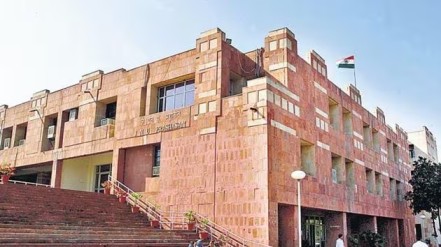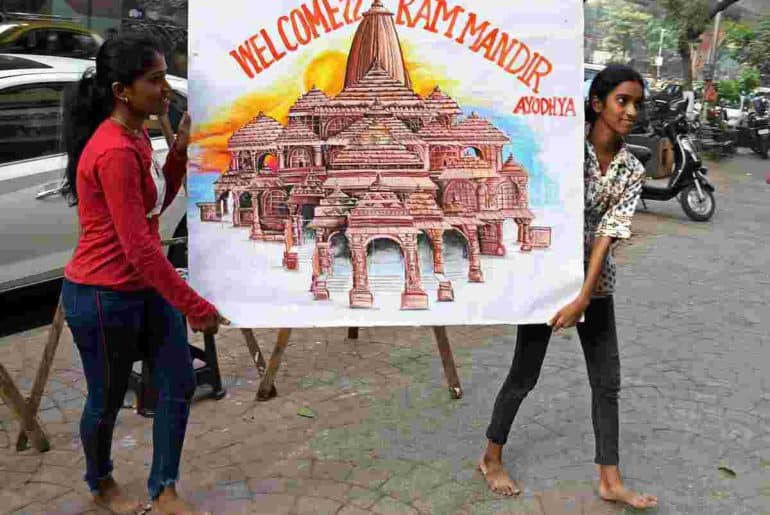This piece delves into the issues that centre around allegations of sexual harassment against Professor Priyadarsi Mukherji, a senior faculty member at the Centre of Chinese and South East Asian Studies (CC&SEAS) within the School of Language, Literature and Culture Studies (SLL&CS) at Jawaharlal Nehru University (JNU) and the subsequent voices challenging the accused.
A second-year Master’s student from the same centre as Prof. Mukherji, has accused him for engaging in unwelcome behaviour, including persistent messaging, calls, requests for “personal” meetings, and sending lewd poems. Moreover, when she rebuffed his advances, the professor allegedly threatened her with academic consequences, specifically mentioning potential failure in her coursework.
The survivor lodged a complaint with the Internal Complaints Committee (ICC) on 10 April, 2024, but no restraining order was issued against the accused by the ICC, and he continued to teach even after that. The Order of Restraint mentioned here is a procedural tool within the Internal Complaints Committee (ICC) of educational institutions. This order is part of the institution’s disciplinary process and it outlines behavioral expectations for the accused during ICC investigations, restricting actions like contacting the complainant or influencing them.
In conversation with DU Beat, Avijit Ghosh, Vice President of JNU’s Student Union, added, “Since the complaint was against a professor by his student, the order also needs to restrict him from teaching. So, after the enquiry process starts, the accused is technically forbidden to take classes of the second year batch as the survivor is from that batch. However, the accused professor was taking classes for both M.A. 2nd year and 1st year. All the 13 batch mates of the victim are demanding that he should be debarred from teaching in any of the batches in the center and not just their batch as he can exert some influence if he continues coming to the center to teach other batches while the enquiry process is still going on; so they want this to be addressed under the restraining order which has not happened yet”.
Upon no concrete action, the students of CC&SEAS filed a complaint of sexual, mental and academic harassment on 15 April, 2024 with the ICC.
Avijit shared, “The union is in constant touch with the student. Two days before we met the students of M.A. second year batch with school councillors. The students also had a meeting with the VC to demand a speedy enquiry, however no action was taken, neither was any interim relief provided to the survivor or the class by the ICC.”
He also underscored the inadequacies of the Internal Complaints Committee (ICC) in addressing harassment cases effectively. He highlighted the need for a more transparent and student-inclusive body, drawing attention to the previous Gender Sensitization Committee Against Sexual Harassment (GSCASH), which had elected student representatives. He claims that the ICC can be partial, in its judgements.
In response to the situation, the JNUSU has issued several demands to the university administration, including the immediate restraint and strict disciplinary action against Prof. Mukherji (including suspension), the acceleration of complaint proceedings, and assurance of protection from any academic repercussions for the survivor.
Additionally, there was also a demand for postponement of the seasonal exam and setting a new date for the exam. A Master’s student from the School of Language, in conversation with DU Beat, revealed, “Since many M.A. Second year students have not been attending classes for 15 days or more, and their sessional exams were ensuing, they demanded the session should be postponed and they should be given more time (about one and a half weeks) to prepare well and this demand was accepted by the Chairperson of Chinese And Southeast Asian Studies Center.”
He also revealed that the students went to meet the chairperson, “While the chairperson said that they’ll look into the matter, he also said that they as, faculty members don’t have much to do in this, and it is the job of ICC, which is not acknowledging any sexual harassment activities. Whenever a survivor tries to file a complaint in ICC, questions like, ‘What type of dress were you wearing?’, ‘You were out with whom?’, ‘What was the time when you were out?’ are asked which makes the process of filing a complaint even more upsetting.”
There has also been the involvement of student organizations like ABVP, who during one of the protests against the inaction, supposedly threatened and barged into the accused’s office, which students of the department protested against. Even, AISA DU condemning the university administration’s handling of the matter and calling for the reinstatement of the Gender Sensitization Committee against Sexual Harassment (GSCASH).
Anjali, AISA DU Secretary, in conversation with DU Beat shared, “Being a gender minority and a student, it’s scary how over the past 10 years, sexual harassment and rape have come to be normalized in our campuses.”
This case underscores broader concerns about the handling of sexual harassment complaints within academic institutions and the urgent need for institutional accountability and support for survivors.
Similar allegations of sexual harassment have been made in Delhi University’s Psychology Department. In the wake of this students are demanding swift action in the form of increased surveillance and security.
According to Simran, a student representative from the Students’ Federation of India (SFI), the need for a functional Women’s Development Cell or a GSCASH within the university, is imminent. She emphasized, “I met the HOD today and they told me an academic council is being made for patrolling day in and day out. But the psych department comprises women majorly, and, sadly, the patrolling will be again done by men. There needs to be a woman’s body to deal with this issue… We need a university-level body, a movement surpassing departments (because this has happened with the English and B.Ed. department too in the past), engaging with women and queer people on campus, and a student-run cell.”
The demands put forth by students include expedited inquiries into the reported incidents, immediate action against those responsible for the harassment, and the establishment of a transparent and accountable mechanism to address cases of sexual harassment on campus. Additionally, students are advocating for gender sensitization programs and initiatives to create a safer and more inclusive environment for all members of the university community.
Image Credits: Youth Ki Awaaz
Kavya Vashisht
Read Also: delhi-universitys-swift-response-to-sexual-harassment-allegations-garners-campus-solidarity/










